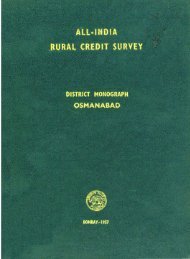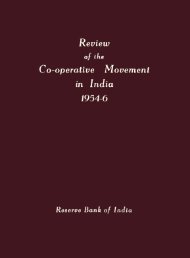Title : Royal Commission on Agriculture in India - Reserve Bank of ...
Title : Royal Commission on Agriculture in India - Reserve Bank of ...
Title : Royal Commission on Agriculture in India - Reserve Bank of ...
You also want an ePaper? Increase the reach of your titles
YUMPU automatically turns print PDFs into web optimized ePapers that Google loves.
147<br />
(b) (iii) The large percentage <strong>of</strong> cereal crops culti\'ated presupposes a sufficiency<br />
<strong>of</strong> dry foddel' throughout the Prov<strong>in</strong>ce, but a large quantity is sold<br />
<strong>of</strong>f, The cultivator, as a rule, feeds the cattle properly dur<strong>in</strong>g the busy<br />
seas<strong>on</strong> <strong>on</strong>ly, turn<strong>in</strong>g them out to graze <strong>in</strong> the recently han'ested fields and<br />
waste lands for the rema<strong>in</strong><strong>in</strong>g part <strong>of</strong> the year, l;'ith the result that the<br />
animals are almost stan'ed out, The pPc,uniary liabilities <strong>of</strong> the farmer are<br />
the ma<strong>in</strong> <strong>in</strong>centive to the sale <strong>of</strong> fodder.<br />
(iv) In the dry seas<strong>on</strong>, December to July, green feed is not available and<br />
its absence tells much <strong>on</strong> the yield <strong>of</strong> milch cattle.<br />
(c) April to June is the period <strong>of</strong> fodder shortage <strong>in</strong> the Prov<strong>in</strong>ce.<br />
Scarcity <strong>of</strong> fodder exists for twelve weeks throughout April, May and June.<br />
Prelim<strong>in</strong>ary flood<strong>in</strong>g takes place <strong>in</strong> July. After this, young grow<strong>in</strong>g cattle<br />
beg<strong>in</strong> to thrive <strong>on</strong> cultivated fodders and grasses which last till Octoberljovember<br />
.<br />
• (d) Better facilities for irrigati<strong>on</strong> water will improve fodder supply.<br />
(e) 1. For the benefit <strong>of</strong> village cattle Government should make hun<br />
grants for the growth <strong>of</strong> babul trees and natural grasses to each village, to<br />
be managed by the villagers themselves <strong>on</strong> the basis <strong>of</strong> co-operati<strong>on</strong>. Each<br />
hun may be about ten acres or more, depend<strong>in</strong>g up<strong>on</strong> the size <strong>of</strong> the village.<br />
2. Breed<strong>in</strong>g bulls from Government cattle stati<strong>on</strong>s should be issued gratis<br />
<strong>in</strong> the first <strong>in</strong>stance to important ,'illages.<br />
3. Annual cattle exhibiti<strong>on</strong>s <strong>on</strong> a small scale may be held <strong>in</strong> each taluka,<br />
prizes be<strong>in</strong>g awarded <strong>on</strong> the basis <strong>of</strong> actual performance and c<strong>on</strong>stituti<strong>on</strong>.<br />
QUESTION 17.-AGRICULTURAL INDUSTRIEs.-(a) In places where both rabi<br />
and khari/ cultivati<strong>on</strong> is possible, the cultivator has work all the year round i<br />
but where there is khan/ cultivati<strong>on</strong> <strong>on</strong>ly he has <strong>on</strong>ly six m<strong>on</strong>ths' work.<br />
In the slack seas<strong>on</strong> he--<br />
(1) takes a h'oliday to attend fairs, <strong>of</strong> which there is a good number <strong>in</strong><br />
S<strong>in</strong>d;<br />
(2) attends religious or social functi<strong>on</strong>s <strong>in</strong> or out <strong>of</strong> his village;<br />
(3) does cart<strong>in</strong>g and camel driv<strong>in</strong>g <strong>on</strong> wages;<br />
(4) is engaged <strong>in</strong> canal clearance work;<br />
(5) tends his livestock;<br />
(6) works for daily w!lges <strong>on</strong> c<strong>on</strong>structi<strong>on</strong> works, especially near tOWI1S.<br />
(c) Extremes <strong>of</strong> climatic c<strong>on</strong>diti<strong>on</strong>s do not favour bee-keep<strong>in</strong>g and sericulture.<br />
Poultry rear<strong>in</strong>g is already d<strong>on</strong>e <strong>on</strong> a limited scale,. Fruit grow<strong>in</strong>g<br />
will not be undertaken by the cultivator as he has no permanent <strong>in</strong>terest <strong>in</strong><br />
the hold<strong>in</strong>g, nor are the c<strong>on</strong>diti<strong>on</strong>s <strong>of</strong> water supply favourable. For lac<br />
culture and rope mak<strong>in</strong>g there is some scope and they are practised ,wherever<br />
the necessary material is available. There is no scope for pis(,iculture as<br />
there is already a large quantity <strong>of</strong> fish available naturally.<br />
(e) Wherever there is raw produce, c<strong>on</strong>cerns such as g<strong>in</strong>n<strong>in</strong>g factories and<br />
rice hull<strong>in</strong>g mills have already established themselves near rural areas and<br />
these absorb some <strong>of</strong> the spare labour. Similarly small flour mills may with<br />
advantage be opened <strong>in</strong> wheat grow<strong>in</strong>g tracts.<br />
(g) In view <strong>of</strong> the anticipated agricultural development <strong>of</strong> S<strong>in</strong>d due to<br />
the Lloyd Barrage, rur,al populati<strong>on</strong> will have sufficient employment <strong>in</strong> agricultural<br />
operati<strong>on</strong>s all the year round.<br />
(h) Travell<strong>in</strong>g health <strong>of</strong>ficers should be appo<strong>in</strong>ted whose duty it should be<br />
to tour rural arei's periodically and lecture <strong>on</strong> the elements <strong>of</strong> hygiene.<br />
QUESTION 18.-AGBlCULTUIlAL LADouR.-(a) (i) This Prov<strong>in</strong>ce be<strong>in</strong>g sparsely<br />
populated, there is no need'to attract agricultural labour from <strong>on</strong>e area to<br />
another.<br />
(ii) Large tracts <strong>of</strong> cultivable land rema<strong>in</strong> uncultivated at present for<br />
want <strong>of</strong> water. When the Barrage is <strong>in</strong> work<strong>in</strong>g order people from c<strong>on</strong>gested<br />
areas outside S<strong>in</strong>d will have to be attracted by giv<strong>in</strong>g them grants <strong>of</strong> land,<br />
•<br />
Khan Bahadur Gulmahomed Abdur Rahman.




